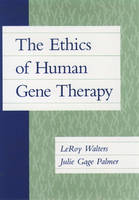
The Ethics of Human Gene Therapy
Oxford University Press Inc (Verlag)
978-0-19-505955-7 (ISBN)
- Titel ist leider vergriffen;
keine Neuauflage - Artikel merken
David, a boy afflicted with the inherited disorder severe combined immune deficiency (SCID), spent almost his entire life inside a protective bubble shielded from the bacteria and viruses that his frail immune system was unable to combat. If a technique capable of repairing the gene that carried SCID had been available, David could have had a normal childhood and lived past puberty. It is because of his death, and the thousands of other untimely deaths of both children and adults that the field of human gene therapy-the attempt to cure or prevent disease at the DNA level-has gained such significance. The authors of this absorbing new book describe the science of gene therapy in terms easily accessible to the non-specialist, and focus on the controversial ethical and public policy issues surrounding human intervention in heredity. The book is organized in five chapters. In the first, Walters and Palmer offer a brief survey of the structure and functions of DNA, genes, and cells. Next, the authors discuss three major types of potential genetic intervention.
Chapter 2 deals with the current techniques of gene addition-using non-reproductive (somatic) cells in an effort to cure or treat disease. Chapter 3 addresses the technical and ethical questions facing attempts to prevent disease through genetically modifying early human embryos or sperm and egg cells. Chapter 4, in many ways the most original part of this volume, confronts the issue of employing genetic means to improve human abilities and appearance. Depending on the techniques employed, such enhancements could affect only the individuals receiving the intervention or could be passed on to the next generation. Three types of genetic enhancements are considered: physical enhancements (for size, the need for sleep, and aging); intellectual enhancements of memory and general cognitive ability; and moral enhancements for control of violently aggressive behavior. The authors maintain that genetic enhancements should be evaluated individually rather than being condemned in principle or as a group. The final chapter summarizes the public review process through which human gene therapy proposals have been examined in the United States since 1990.
Five appendices, providing technical background information along with a complete list of questions raised in the national public review process, supplement the discussion.
LeRoy Walters, Ph.D., is the Joseph P. Kennedy Professor of Christian Ethics at the Kennedy Institute of Ethics, Georgetown University. He is also a Professor of Philosophy at Georgetown University. Julie Gage Palmer, J.D., is an attorney with Hopkins & Sutter in Chicago, Illinois.
1. Genes: Function and Heredity; 2. Somatic Cell Gene Therapy; 3. Germ Line Gene Therapy; 4. Enhancement Genetic Engineering; 5. Public Policy on Human Gene Therapy; 6. Appendix A: Further information on Mitosis and Meiosis; 7. Appendix B: Background Information on Mendelian Inheritance; 8. Appendix C: Additional Methods for Delivering Genes to Cells; 9. Appendix D: The "Points to Consider" Developed by the NIH Recombinant DNA Advisory Committee; 10. Appendix E: Background Information on Homologous Recombination
| Erscheint lt. Verlag | 9.1.1997 |
|---|---|
| Zusatzinfo | 1 halftone, line figures, tables |
| Verlagsort | New York |
| Sprache | englisch |
| Maße | 154 x 234 mm |
| Gewicht | 571 g |
| Themenwelt | Medizin / Pharmazie ► Medizinische Fachgebiete ► Medizinethik |
| Studium ► 2. Studienabschnitt (Klinik) ► Humangenetik | |
| Studium ► Querschnittsbereiche ► Geschichte / Ethik der Medizin | |
| ISBN-10 | 0-19-505955-7 / 0195059557 |
| ISBN-13 | 978-0-19-505955-7 / 9780195059557 |
| Zustand | Neuware |
| Haben Sie eine Frage zum Produkt? |
aus dem Bereich


